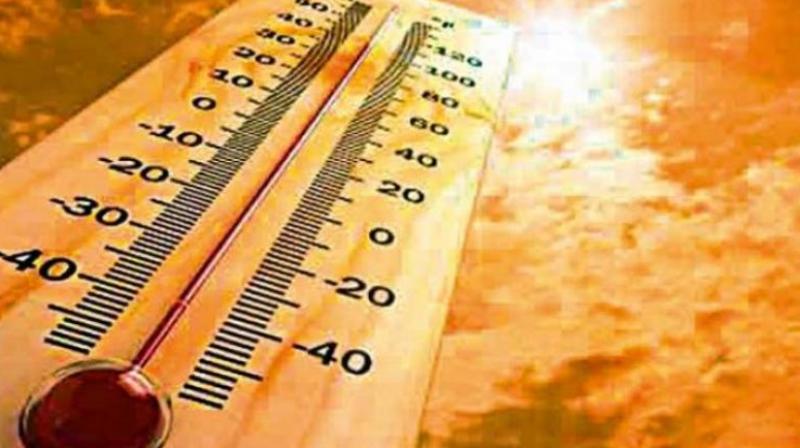Protect yourself from the heat
Heat waves have taken over the country, causing a rise in heat strokes, dehydration, and other heat-related ailments.

With temperatures soaring at 2-3 degrees Celsius above normal, the persisting hot weather is leading to increased incidences of heat strokes, dehydration, and other heat-related ailments which are known to peak during the summer season. Dr Aftab Ahmed, a senior consultant physician at Apollo Hospital, explains the various conditions and the precautionary measures that should be taken to dodge the heat effectively.
QWhat is a heat stroke? What causes it, and what are its symptoms?
A heat stroke occurs when one’s core body temperature rises above 40ºC (104ºF). It is caused by the failure of thermo regulation and is usually accompanied by central nervous system dysfunction.
Ideally, sweating helps maintain a healthy body temperature as it enables the loss of heat through evaporation. However, when dehydrated, one may not sweat as much and that can lead to their blood becoming concentrated, thereby impairing organ function. Subsequently, several organs may suffer tissue damage.
Symptoms of heat stroke include high body temperature, lethargy, dizziness, nausea, hot red dry skin, rapid pulse, and altered mentation.
QWhat measures can one take to help someone who might have had a heat stroke?
A heat stroke is a medical emergency and demands prompt medical attention. Below is a step-by-step guide to helping a patient who might have come down with a heat stroke:
1. Call for an ambulance.
2. While waiting, shift the patient to a cool place and lay them down, preferably on their side.
3. Take off excessive clothing and sponge the person with cold water and place ice packs or cold wet towels on the person’s head.
4. Fan the patient.
5. Shift the patient to the nearest hospital for further care.
However, one must avoid administering fluids to an unconscious patient.
QHow can heat strokes be prevented?
Some measures that can be taken to prevent heat strokes.
1. Drink plenty of water or other cool, non-alcoholic fluids. Avoid very cold liquids as they can lead to stomach cramps.
2. Avoid performing physical activities in hot weather, especially between 11 am and 3 pm. If unavoidable, try rescheduling such activities to the cooler hours of the day.
3. Rest often.
4. Spend as much time indoors as possible, and ensure ventilation. Draw your blinds or curtains and use air conditioning if possible.
5. Eat smaller meals often. Avoid alcohol and caffeinated beverages.
6. Wear light-coloured, loose-fitting cotton or linen clothing.
7.Use hats, umbrellas, sunglasses, and sunscreens.
8. Check in on older people, sick and frail family members, friends, and neighbours who might need help coping with the heat. Call them at least once a day when the weather seems unbearably hot.
9. Never leave children, older people, or pets in cars.
QA large number of people are resorting to consuming packaged fruit juices and carbonated drinks to combat the summer heat. Does this affect the body negatively?
Packaged fruit juices and carbonated drinks are especially harmful during the summer. Most packaged beverages contain high amounts of artificial sugars, which essentially means extra calories, and caffeine which, in excess, can leave one feeling parched and uneasy.
QWhat foods would you recommend for diabetics and blood pressure patients to consume during the summer?
Tomatoes, zucchini, dark leafy greens, and salmon are considered very healthy for diabetics and blood pressure patients to consume during the summer. Additionally, fruits like watermelons, apples, oranges, figs, pears, apricots, avocados, blackberries, and raspberries can help patients in regulating body temperature without having much effect on blood pressure or sugar levels. Yogurt is also considered very effective in maintaining a healthy body temperature during the summer.
QIt is considered harmful to consume more than 3 servings of coconut water daily. Why is it so?
Coconut water is rich in electrolytes and potassium, which is excellent for hydration. However, too much coconut water can cause Hyperkalemia, a condition characterised by an abnormal increase in levels of potassium. Hyperkalemia is a common cause of life-threatening arythmia and ventricular fibrillation. Therefore, one must be cautious about limiting their coconut water consumption to 3 servings a day, which sums up to a litre every day.
QWhat foods must be avoided during summers?
A large number of cases of heat boils and rashes are noted during summers. Avoiding the following foods can help minimize the occurrence of such issues:
Meats, spicy foods, fried foods and fast foods like french fries, burgers, salty snacks, sauces and alcohol should be avoided.
QWhat basic precautions must be taken in order to maintain healthy body temperature?
While it is essential to consume plenty of fluids, alcohol, packaged beverages and caffeine must be avoided as far as possible. It is also a better idea to eat smaller meals more frequently throughout the day than to eat three or four large meals every day. Also, one must avoid going outdoors during the hottest part of the day. With respect to clothing, loose-fitting clothes and hats and umbrellas can help prevent body temperature from rising. Lastly, sunscreen and sunglasses are recommended.

